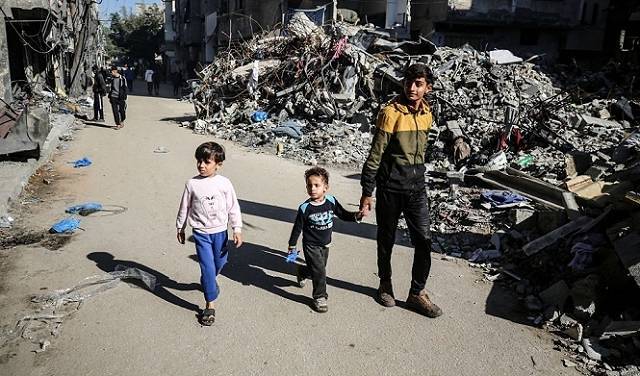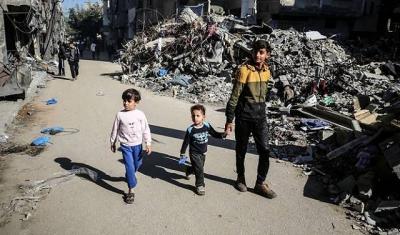Two months into the outbreak of war in the Gaza Strip, most of its residents have been displaced and overcrowded due to the intense Israeli bombardment in smaller areas within the already narrow strip, where the elderly and newborns live in tents amid the rubble. Three women, forced out of their homes in Gaza after 61 days of fighting, find themselves in a dire situation as they desperately seek safe refuge after fleeing from place to place under the weight of airstrikes and artillery fire.
Zainab Khalil (57 years old) is trying to relocate for the fourth time as Israeli tanks invade the southern city of Khan Younis. Israa Al-Jamala (28 years old) lives in a tent with her infant daughter, who was born on the night the one-week truce began. Mai Salem passes by the Egyptian border, fearing that she and her family will be forced to cross it to live a life of permanent exile.
The majority of Gaza's 2.3 million residents were taken by surprise by the sudden disaster that began unfolding on October 7, when Israeli fighter jets commenced attacks in response to a surprise incursion by the Palestinian Islamic Resistance Movement (Hamas) across the border that Israel says resulted in the deaths of 1,200, most of them civilians. Eighty percent of Gaza's population is now displaced, many of whom have been uprooted multiple times. Their homes, businesses, mosques, and schools have been damaged or destroyed due to the intense Israeli assault. Health authorities in Gaza report that 17,177 people have been killed in the area.
With no real signs of an imminent ceasefire, Palestinians, mostly living outdoors, have limited food or clean water and are trying to calm frightened children who scream at night as bombs and shells fall. Al-Jamala, holding her sleeping daughter, also named Israa, among the suddenly swollen number of tents around a hospital in Deir al-Balah in central Gaza, said, "Every new mother should be at home, raising her child with her mother and her family." She mentioned that her family moved to a temporary camp in front of al-Aqsa Martyrs Hospital after their home was bombed. Baby Israa was born there on November 24, the night the truce began, rekindling hopes for a reduction in hostilities. However, fighting resumed after a week, and the family remained in their tent, a carpet covering the sand, where baby Israa sleeps in a small crib.
The family, like many others in Gaza, struggles to find food and other essentials. Al-Jamala said, "Look at the extent of our needs. There is no milk. There is no powdered milk." Even when the war eventually ends, she is unsure what they will do after their home was bombed. She continued, "Where will we stay? Where can we raise this child? Where can we live?"
Zainab Khalil lived in the Sheikh Radwan neighborhood of Gaza City near the al-Shati refugee camp in the north of the strip. Israel began ordering residents to move south in mid-October, yet continued its airstrikes throughout the region. Zainab did not want to leave, calling it the hardest decision of her life. She eventually moved to a nearby refuge, thinking she would be safe from the bombardment, but airstrikes intensified about ten days after her decision to leave.
Speaking of her arduous journey from one refuge to another, she described it as "a journey filled with fear, despair, displacement, and sadness under the weight of intense bombing." As Israeli forces surged into Gaza City and besieged Al-Shifa Hospital, Zainab headed south with her family and a friend, sometimes walking and at other times riding on a donkey-pulled cart.
Zainab mentioned that while crossing one of the frontline areas, Israeli soldiers ordered them to "walk a little, then stop, walk then stop," for four hours. She eventually ended up in a school being used by about 30 displaced people as a refuge in Khan Younis, the same place where some of her sisters’ daughters also ended up. Zainab stated, "In this war, those who are not killed by the bombs are killed by sickness, sadness, and despair." However, the Israeli army is now ordering people to leave Khan Younis as well, and Zainab must look for a new place to stay.
### Rafah
The only remaining city to flee to is Rafah, which borders Egypt. Most residents of Gaza are descendants of refugees who fled or were expelled from their homes during the Nakba of 1948. Many fear that they will once again become refugees, forced to leave all of Gaza. As Mai Salem approached the border fence, she and a friend looked toward Egypt. Having fled her home in Gaza City, she first headed to Nusseirat, then to Khan Younis, and eventually settled in Rafah after the Israeli army ordered individuals to relocate again.
Mai said, "For us, this is the last stop. After this, if they want to forcibly displace us, we will not leave. They can kill us here, but we will not leave our land and our entire life. We will not do that."




